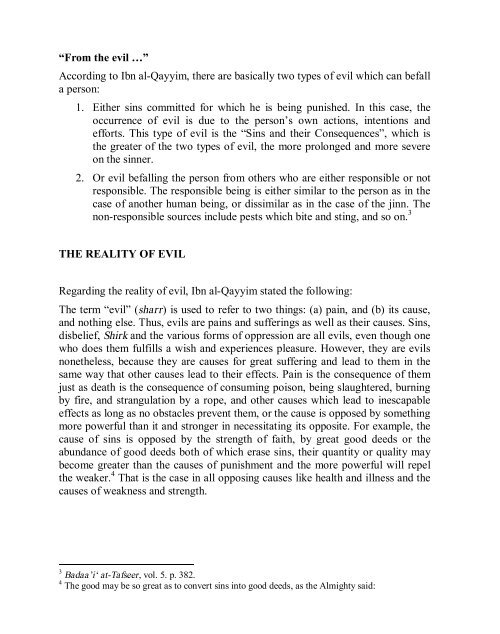You also want an ePaper? Increase the reach of your titles
YUMPU automatically turns print PDFs into web optimized ePapers that Google loves.
“From the evil …”<br />
According to Ibn al-Qayyim, there are basically two types of evil which can befall<br />
a person:<br />
1. Either sins committed for which he is being punished. In this case, the<br />
occurrence of evil is due to the person’s own actions, intentions and<br />
efforts. This type of evil is the “Sins and their Consequences”, which is<br />
the greater of the two types of evil, the more prolonged and more severe<br />
on the sinner.<br />
2. Or evil befalling the person from others who are either responsible or not<br />
responsible. The responsible being is either similar to the person as in the<br />
case of another human being, or dissimilar as in the case of the jinn. The<br />
non-responsible sources include pests which bite and sting, and so on. 3<br />
THE REALITY OF EVIL<br />
Regarding the reality of evil, Ibn al-Qayyim stated the following:<br />
The term “evil” (sharr) is used to refer to two things: (a) pain, and (b) its cause,<br />
and nothing else. Thus, evils are pains and sufferings as well as their causes. Sins,<br />
disbelief, Shirk and the various forms of oppression are all evils, even though one<br />
who does them fulfills a wish and experiences pleasure. However, they are evils<br />
nonetheless, because they are causes for great suffering and lead to them in the<br />
same way that other causes lead to their effects. Pain is the consequence of them<br />
just as death is the consequence of consuming poison, being slaughtered, burning<br />
<strong>by</strong> fire, and strangulation <strong>by</strong> a rope, and other causes which lead to inescapable<br />
effects as long as no obstacles prevent them, or the cause is opposed <strong>by</strong> something<br />
more powerful than it and stronger in necessitating its opposite. For example, the<br />
cause of sins is opposed <strong>by</strong> the strength of faith, <strong>by</strong> great good deeds or the<br />
abundance of good deeds both of which erase sins, their quantity or quality may<br />
become greater than the causes of punishment and the more powerful will repel<br />
the weaker. 4 That is the case in all opposing causes like health and illness and the<br />
causes of weakness and strength.<br />
3 Badaa’i‘ at-<strong>Tafseer</strong>, vol. 5. p. 382.<br />
4 The good may be so great as to convert sins into good deeds, as the Almighty said:














